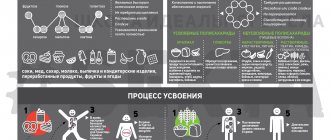The controversy surrounding the number of eggs that a healthy person can eat per day has not subsided for several years. The official position of doctors varies from “no more than 2 pieces a week” to “at least 20 pieces a day.”
We all have firmly learned “Eggs contain cholesterol. Cholesterol is atherosclerosis.” It is this question that I want to consider today, because... Other dangers posed by eggs, such as salmonellosis and allergies, fall more into the common sense category.
So, eggs.
The World Health Organization recognizes the egg white of a chicken egg as the standard of biological value for humans.
Proteins that enter our body have a different set of amino acids involved in the synthesis of the body’s own protein, therefore, to compare the protein composition of products, such a concept as the Biological Value of Products was introduced
The value of the protein contained in other foods is determined by comparing them to an egg. If it were possible to store food in the Chamber of Libra and Measures, then there would definitely be a display case in which a chicken egg would lie on a velvet pillow.
Calorie content and composition of chicken eggs
Chicken eggs have high nutritional value.
Calorie content 100 gr. product 157 kcal. Chicken eggs contain:
- proteins;
- fats;
- carbohydrates;
- essential amino acids;
- sterols;
- fatty acid;
- vitamin A;
- B vitamins;
- vitamin D;
- vitamin E;
- vitamin K;
- water;
- phosphorus;
- potassium;
- sulfur;
- magnesium;
- calcium.
Despite the composition rich in vitamins and microelements, chicken eggs can be harmful to the body if consumed in excess. There are clear recommendations from doctors who say how many eggs you can eat without harm to your health. Let's look at them.
When prohibited
Use if you are allergic to proteins is strictly prohibited. A similar reaction can also occur to yolks, but less frequently.
The ban applies to people suffering from psoriasis. You need to be careful when stones are found in the kidneys or gall bladder. In this case, excessive consumption is harmful, since it may cause bloating, which can put pressure on diseased organs, which will negatively affect your well-being.
How many eggs can you eat a day
To understand how many eggs an adult can eat per day, experts studied the beneficial properties of the product and determined the consumption rate. The nutritional properties of 1 egg are comparable to a glass of milk and 50 grams of meat. Chicken eggs are 97% digestible by the body. Due to its high nutritional value and high degree of digestibility, the product is included in therapeutic diets.
For adults, children and athletes
In the absence of health problems, chicken eggs can be consumed daily, in reasonable quantities . Doctors recommend eating no more than 1-2 eggs per day.
At the same time, if you are on a therapeutic diet, then the consumption rate is reduced to 2-3 per week. The risk group is people with high cholesterol levels. They should reduce their consumption of eggs to 1-2 per week or eliminate them altogether.
Eggs should be introduced into children's diets from the second year of life. Answering the question of how many eggs a one-year-old child can eat, doctors agree - 1 per week. Gradually you can increase the number of eggs to 3-4 per week. Children should be given boiled eggs. They are better absorbed and retain maximum nutrients.
Chicken eggs are a favorite product of athletes. Due to high physical activity, the body processes food faster, so athletes can increase the number of eggs they eat without harming their health.
Proteins contain large amounts of essential amino acids, which are important for gaining muscle mass. Professional bodybuilders eat up to 10 eggs a day. Raw or boiled eggs are eaten. Due to the high fat content in yolks, nutritionists recommend limiting product consumption to 3-5 pieces. per day and take 1-2 day breaks.
To understand how many eggs an athlete can eat per day, you need to decide on the goal - gaining muscle mass or cutting. To gain muscle mass, eat 10 eggs a day; at the drying stage, athletes exclude yolks from the diet and consume 10-20 whites per day.
Bowl omelette with salmon and spinach
Photo: Lotus Room Restaurant
Recipe by Andrey Kaplunov, chef of the Lotus Room restaurant
- 3 eggs
- 50 g tomatoes
- 50 g avocado puree
- 10 g spinach
- 50 g smoked salmon
- 10 ml olive oil
- salt and pepper
Step 1 . Beat eggs and salt in a bowl until smooth and pour into a hot frying pan with olive oil. As soon as the mixture begins to set at the edges, use chopsticks to assemble the omelette towards the center. When serving, place the omelette on a plate, next to it put spinach, chopped Uzbek tomatoes, avocado puree, and smoked salmon. Drizzle olive oil over everything.
How many eggs can you eat per week?
Based on the daily rate of egg consumption, you can calculate how many eggs adults, children and athletes can eat per week. It is important to clarify that this product is best eaten boiled rather than fried. Soft-boiled or hard-boiled eggs are better absorbed by the body and saturate it with “healthy” cholesterol, without which it cannot function normally. Fried food is harmful - it saturates the body with “bad” cholesterol.
For adults, children and athletes
It is beneficial for adults without health problems to eat up to 6-7 eggs per week. Doctors recommend consuming this product every other day.
Eggs are important for the normal development of a child's body. If the child is not allergic to this product, then answering the question of how many eggs a child can eat per week, doctors give the following recommendations:
- children from 2 to 3 years old - 3 yolks;
- from 4 to 6 years - 3 eggs;
- from 7 to 12 years - 5 eggs.
Athletes must have a large amount of protein in their bodies. It is necessary for muscle recovery after hard training. Considering that the consumption rate of eggs for athletes is higher than for ordinary people, they need to take breaks for 1-2 days and consume this product only on days of intense training.
Chicken eggs are widely used in dietetics. This product has high nutritional value and is easily absorbed by the body. At the stage of losing weight, you need to eat eggs in the first half of the day. If you decide to cook them for dinner, you should skip the yolk. Answering the question of how many eggs you can eat on a diet, nutritionists say 5-6 per week.
Along with chicken eggs, quail eggs are no less popular. We'll tell you how many quail eggs you can eat per day.
Contraindications
According to doctors, the egg diet is unbalanced. To lose weight, they advise simply streamlining your diet. There are contraindications for which this diet cannot be used:
- kidney or liver disease;
- allergy to the main product, citrus fruits;
- problems with the gastrointestinal tract;
- It is prohibited to use the diet for pregnant and nursing mothers.
How many quail eggs can you eat per day?
Quail eggs are included in children's diets and therapeutic diets. This product is an alternative to chicken eggs, especially if you are allergic to chicken protein.
To understand how many quail eggs you should eat per day, you should consider the composition and nutritional value of the product. Unlike chicken eggs, quail eggs contain 2.5 times more vitamins, 4.5 times more iron and 5 times more potassium and phosphorus.
Quail eggs are not susceptible to salmonella contamination, which is also an advantage of this product over chicken eggs. They can be safely eaten raw.
The daily intake of quail eggs for a healthy adult is 5-6 pieces, for older people - 4 pieces. Answering the question of how many quail eggs you can eat per week, experts say - no more than 20-25 pieces.
Quail eggs are included in children's diets after the first year of life. This product normalizes brain function, improves memory and attention. Nutritionists have determined how many quail eggs a child can eat per day:
- Children under 3 years old are recommended to be given 1-2 eggs;
- from 4 to 10 years - 3 pcs.;
- from 11 to 18 years old - 4 pcs.
How to choose the right eggs?
High-quality chicken eggs must have a clean shell of a uniform structure, without cracks, and be consistent in weight and size. The category is marked on the shell:
- “D” – dietary egg, with a shelf life of no more than 7 days;
- “C” – table food, can be stored for up to 25 days.
The next marking sign is the type of egg, depending on its weight. An egg of the highest category “B” weighs 75g or more; selected “O” – from 65 to 75g; Next comes the 1st category egg (55-65g); 2 (45-55g); 3 – from 35 to 45g. For those wishing to lose weight, it is important to know that the larger the egg, the higher its calorie content. In the selected variety, for example, there are 85 units.
The most important indicator of egg quality is their freshness. There are several ways to determine this parameter.
- Bring the egg to your ear and shake: the stale one creates a gurgling sound.
- Pay attention to the shell - a fresh egg has a matte finish, but a stale egg can be glossy.
- The most common way is to immerse the product in water. A completely “drowned” egg is no more than three days old, and one floating on the surface is more than a week old.
- The white of a fresh broken egg does not spread, has a uniform structure and light color.
Some manufacturers enrich food with special mixtures to increase the content of microelements in eggs - for example, iodine or selenium. Then there are special symbols on the packaging.
What is healthier: white or yolk?
Protein contains easily digestible protein. In 100 gr. eggs contain 10 grams. squirrel.
The yolk contains a large amount of fat. These are mainly polyunsaturated and monounsaturated fatty acids that do not have a harmful effect on the body. Saturated fatty acids make up no more than 1% of the total mass of the egg.
The yolk also contains cholesterol, high levels of which have a negative impact on health. One yolk contains 570 mg of cholesterol.
Along with this, the yolk contains choline and lecithin, which regulate the level of fats and cholesterol in the body and are involved in the nutrition of nerve cells. Lecithin improves blood circulation in the brain, improves memory and prevents the development of sclerosis.
At different times, there were different recommendations for eating eggs. It was believed that proteins are more beneficial for the body. Recent studies have shown that moderate consumption of eggs does not have a negative effect on the body. If you have problems with the cardiovascular and digestive systems, egg consumption should be limited. This product has a number of contraindications, which we will discuss below.
Egg diet for weight loss for 1 week: menu for 7 days
Every day you should eat 5 or 6 eggs: 2 for breakfast, the same for lunch, 1 for dinner. Imagine how much cholesterol your body will receive daily. Take pity on your body and health, choose the right way to lose weight. If you find it difficult to decide on your own, and the advice on the Internet is confusing, contact the professional nutritionists of the Elena Morozova Weight Loss Clinic.
If you haven't given up and really want to try this diet, remember that the first meal will always be the same: 2 soft-boiled eggs, an allowed drink, half a citrus fruit.
For lunch you can eat stewed spinach, tomato, cucumber or fruit salad. You are allowed to drink one unsweetened black coffee. Don't forget about half a grapefruit.
When choosing dishes for dinner, give preference to carrot, cabbage and tomato salad, vinaigrette without oil, lean meats, poached sea fish or boiled skinless chicken. You can also take some low-fat cottage cheese or cheese. Wash down your meal with green or herbal tea.
We remind you once again that our clinic is against this system. Even if you pass this test with flying colors and lose a few pounds, as soon as you return to your normal lifestyle, the results will be lost. To stay slim and healthy, you need to make proper nutrition a part of your life. Go to Elena Morozova’s Weight Loss Clinic, and you won’t even notice how you will gain a beautiful, toned body.
What to remember
- Experts recommend that adults consume no more than 1-2 chicken eggs per day, 6-7 per week. The consumption rate of quail eggs is 5-6 per day.
- Eggs are gradually introduced into children's diets, starting from the second year of life.
- Athletes determine how many egg whites they can eat per day based on their goals—for cutting or gaining muscle mass.
- Eggs should be consumed with caution by older people. With age, the product is less absorbed by the body.
Source: https://anukapohudei.ru/skolko-yaic-mozhno-est-v-den
Indications for use
This natural product has long been used to maintain physical fitness after intense physical activity. Eggs are rich in protein, which means they help a person restore and build muscle mass. A mixture of yolk and white without heat treatment is the perfect end to a workout.
In addition, the fresh product fights the manifestations of gastritis associated with increased stomach acidity.
Additionally, raw eggs help solve the following problems:
- lack of vitamins and minerals;
- decreased immunity;
- disorders of the nervous system.
The benefits of raw chicken eggs have been known to people since time immemorial, when the life-giving cocktail was used as a cure for colds, and they also treated disorders of the reproductive function of the body.
Those who suffer from various diseases should not refuse a natural product. A competent approach to the use of eggnog will help cope with many symptoms.











